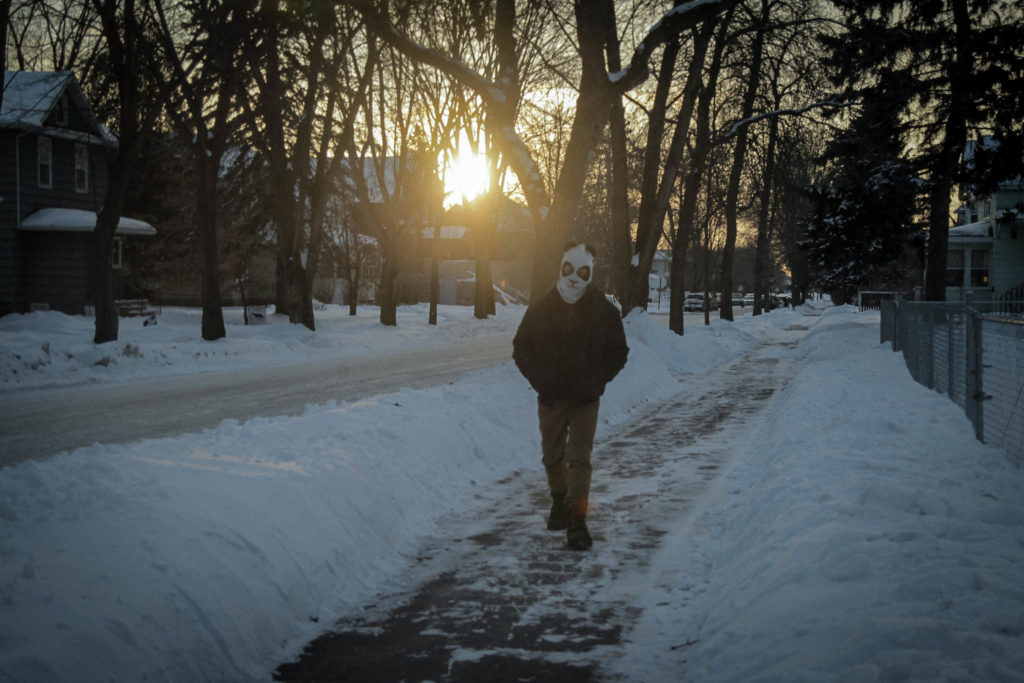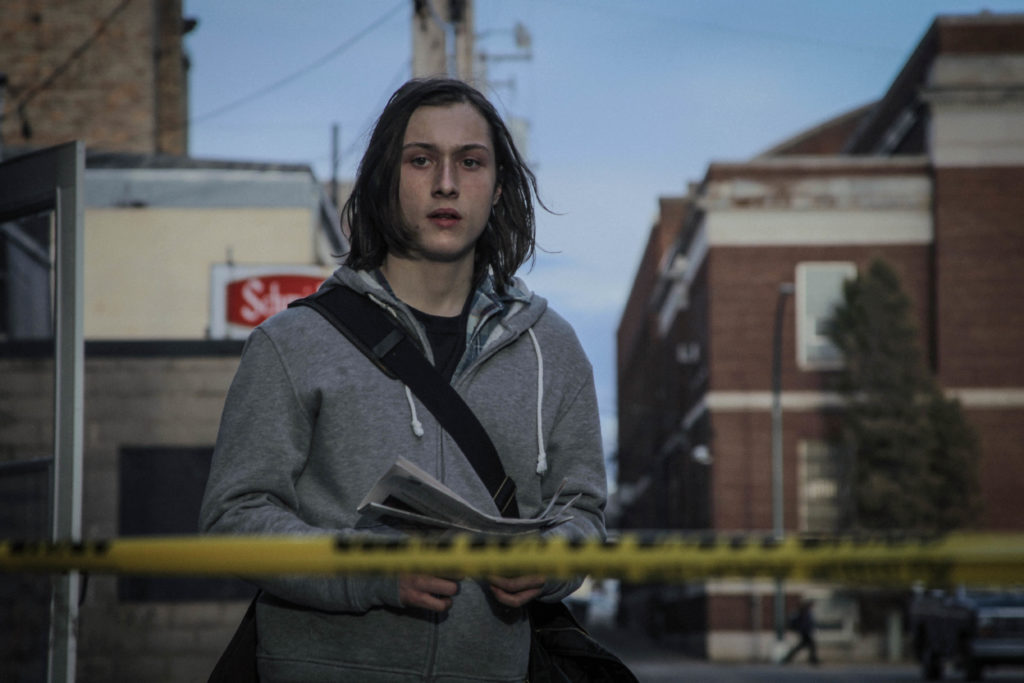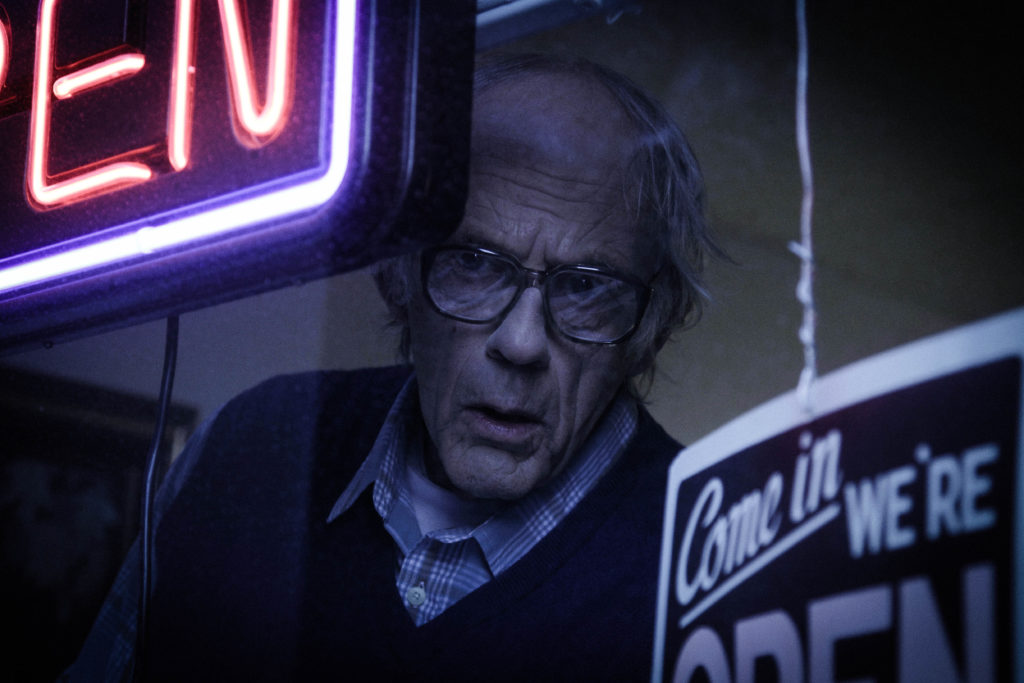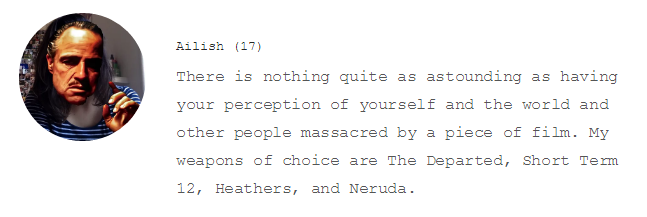Ailish spoke to Billy O’Brien, writer-director of I Am Not a Serial Killer, a dark coming-of-age story set in a whodunit thriller. (Illustration by Mischa)
Congratulations on the film, I thought it was absolutely fantastic. In an interview at the BFI London Festival you mentioned that you “wrote Dan Wells, the author of the novel, a really long letter, and something must have clicked with him.” Once you secured the rights to make the film, it would be six years before you had the capital to produce it.
What draws you to a story like this, and keeps you invested for such a long period of time?
Well, we didn’t know it was going to take six years. I think if we knew we would have run a mile from it. But basically you know as a filmmaker you’ve got two things, one you gotta look at something that’ll make a film and a film that you’ll like so much, that something which will sustain you through this. I think in I’m Not A Serial Killer’s case it was a beautifully written book, it was really strong characters with great dialogue, and damaged, interesting characters, not six American teenagers in a van type thing. So that was fascinating, and also you can immediately see that my job as a writer-director would be so much easier because Dan [Wells, the author of I Am Not a Serial Killer] had done all the hard work in that sense. Then wrapped around this really tight plot, that was just bonkers, and weird, in this incredible sense of place, of a little town in the middle of the mid-west in the snow.
So it ticked all those boxes and particularly with something, you know without spoiling too much, something supernatural in a real place I just found really interesting. And the scale of it, it’s a small story in one sense in terms of the practicalities, you know. It didn’t have vast armies, you know of orcs, charging across the landscape, that would be difficult to do. So it seemed to fit; it felt like a film, and one that would be doable, and that I thought people would like. You know, it sounds simple when you put it like that but, trust me, it doesn’t happen very often, because I might pick up a book and not like it, but you might pick up that book and think “this is the greatest thing ever”, so it’s a lot of personal tastes as well. It makes it difficult.
I Am Not a Serial Killer is a coming-of-age story set in a whodunit thriller. And we haven’t seen, well I personally haven’t really seen something like that since the nineties, not that I was there but, some of my favourites being Heathers and A Nightmare on Elm Street. These thriller style films or these, sort of, black comedies, these satires, that also deal with some sort of coming-of-age, or the growth of teenager. So, what does the thriller genre, bring to the coming-of-age narrative, that you don’t get from, say, the six teenagers in a van?
I like genre, but I like twists in genre, so just like a straight thriller, or a straight horror film can be a little bit bland, and I think combining it with, a coming-of-age, or something just a bit real and a different, makes it stronger. I’ll go back to Stephen King, his books, which I sort of read when I was [about seventeen]. He always had really interesting characters. The main character was really struggling as an alcoholic. It felt so real, that, because, as I learned later, Stephen King had become an alcoholic himself, and so there’s a truth, and honesty to that. I think as an audience, you empathise, and you believe in the characters more, and so, therefore if they’re gonna get hurt, you’re more on edge, then if they’re just these beautiful looking, model types, that you couldn’t care less about. So I think it’s a lot to do with that. It’s also makes it more interesting doesn’t it? It’s more about life, it’s not just a simple little box. It’s got some spikey odd bits that you don’t see very often and all of that makes it much more interesting.
Yeah, you sort of lose this idea that this person is going to get hurt, and therefore you invest yourself, and then, they do get hurt.
Look, I’m a big lover of 1970s films, because that was a decade when the studios in Hollywood kind of lost control. They always say “everything in Hollywood takes place ten years after it happens in real life”, so the craziness of the sixties, really only hit Hollywood in the seventies, and basically they were still making, 1950s films. So suddenly a whole generation of older execs realised they had no idea what the teenagers wanted and they gave a generation of filmmakers’ complete freedom to make what they wanted to make. So you get the oddest, strangest films, in the seventies. They’re just incredible, and I like them because there’s just an honest wildness to it. Just something that’s not created by a factory, and by a committee. The great thing about books is they don’t cost anything to make. We all love books because they take us in very strange and interesting places. Sometimes big films, there’s too much money in them and they just end up being a bit bland.

Alright so speaking of empathy and really sort of identifying with the character of John, is there anything in his character that you see in yourself?
Ah, no he’s quite different, I would have been terrified of the bullies. What attracted me to John (Max Records) is the fact that he’s not terrified of the bullies; he’s afraid he’s going to kill them. That’s something I had never read before and I found that awesome and such an outsider approach. So sadly, he may be odd and has serious problems but he was definitely a lot cooler than I ever was. We have all seen the nerdy kid in the class getting bullied but this was a different way of approaching it. Being bullied was the least of John’s problems, so that was fascinating for me. I would have been Johns mate.
I was thinking during the movie about how it would be if we had seen the film from his friends (Max Bowen played by Raymond Branstrom) perspective and what would that have looked that? Does he think he is a sidekick and that he is in a lot of story? So much happens during a good period of the film and you sort of forget about his friend and then he comes back in at three quarters of film you remember John is a teenager and trying to live his life at some point.
Raymond (Raymond Branstrom) who plays his friend, it’s his first movie and I had never met such a confident kid and he is only 13.
What!
Yeah, he is a big kid. He is hilarious; as I was directing him he had the whole crew in stitches, that’s just him. He is very funny and really bright as well.
I was saying to him in the canteen scene in the school when the bully comes up to John and John has the fork under table – ‘Raymond you’ve been bullied in school haven’t you’, and he just gave me this look, that said ‘You think I’ve been bullied?’ He couldn’t get into the mindset because he is so confident. He was a real find and a great kid. He is from Upstate Minnesota – in the woods.
 You and Christopher Hyde adapted this film from the novel, were there any notable plot points, scenes, or lines which either just made the movie, or just missed out?
You and Christopher Hyde adapted this film from the novel, were there any notable plot points, scenes, or lines which either just made the movie, or just missed out?
There were loads of little bits because the dialogue was so wonderful and there was a lot more deeper character stuff going on. The main change we made was that the book was written first person, so you were in Johns head the whole time and they were some really funny witty stuff as John observes the world.
We tried it in the script but the problem in the film context when you have a voice over sometimes it feels like a security blanket – you never doubted that John was a good kid, you never worried that he might do something. When we stripped it off we realised that you are on the edge of your seat not knowing if this is a real problem for John or just a teenage thing where he thinks he has. That uncertainty really added tension to the film. When you read the book there is a wealth of material about John and his problems and his family. One of the casualties in the film is Brooke, the girl who likes him, because the relationship between them is really interesting. John does like her and it’s not like a nerd who is too shy to talk to her, he is worried about stalking her and he keeps away from her all the time.
In a Hollywood traditional film at the end he would have saved Brooke (Lucy Lawton) somehow from the killer. Brooke played a huge role in the second book and we didn’t want to destroy that and we wanted to keep it honest for Brooke. The first book is about John and his mum and John and Mr Crowley. So we kept it as that rather than a more traditional boy meets girl type route. There was stuff like that, that were tricky decisions to make.
One of the things we added – I found in the book there was never a place where John and Mr Crowley (Christopher Lloyd) met, where he knew it was John hunting him. So we invented the funeral scene where Crowley sits next to John. That’s one of the parts I was worried we were straying too far but it was essential for the film to do that. The book has other things in it which means you wouldn’t miss it but in the film you would.
 So, moving away from I Am Not a Serial Killer for a moment. What is it about film, specifically feature-length, fictional film that appeals to you, as a medium for storytelling?
So, moving away from I Am Not a Serial Killer for a moment. What is it about film, specifically feature-length, fictional film that appeals to you, as a medium for storytelling?
I would have to go back to when I was your age and went to art college and then film school. I was into comics because I liked drawing but was never good enough to be completely honest so I ended up doing story boards for friends, and that got me interested in the whole storytelling in film.
I love the fact when I do something, either write it or adapt it, just on a page with my little doodles and what we end up with is a not on your computer screen but for me it’s a room full of people looking at it on a screen the size of a house and when the whole audience laughs at a joke you wrote two years previously or in this case what Dan Wells may have written. That is just such a thrill and if we can sustain their interest, in a dark room with their phones turned off for two hours and they really get it, that’s the thrill for me. I love that as a story teller when that works. I sort of drifted into it, I went to art college, drawing and painting and ended up doing this and it seems to be the only thing I can do.
That’s what they say about the business – if you can picture yourself doing anything else, do that – don’t be here.
An older actor in Ireland said to me once if you look at a film and think you would love to work with the makers of that then you might end up as crew (camera, sound) because you love to be a part of that. But if you look at film and go Wow I wish I could have made that film or I could have made that film better you will be a director. I thought that was pretty good advice.
Considering that people will often refer to this time as the ‘Golden age’ of television but there is something completely different in film. Television is not just longer movies, it’s a different set up, and there is something about film and watching a film in a cinema that you can’t replicate in any other way.
I agree, this is the golden age of TV. We don’t watch too much of it but with something like Breaking Bad or Game of Thrones, they are epic in scale and they can do a long form story a lot more justice than a film. I really hope video-on-demand and watching film on phones doesn’t kill the cinema part of it, that would be such a shame.
Yes, I work in a cinema, I am a cinema usher so please let’s hope and pray it doesn’t kill that.
Yeah, I still shoot on film so I’m definitely in the stone ages in terms of technology, no Facebook or anything. I am still holding onto my ideas and hoping there’s people there to still watch them when I eventually get them made.
There’s room for everything I think – it’s horses for courses, I haven’t done telly myself. Maybe next year I’ll do something if it’s good for the money, if nothing else. But as a director for TV you don’t get to choose as much because when you come on they have already cast it, built the sets and to be honest that’s a little boring for me. I like creating my own world.
Is there a film or a director that comes to mind when you think about what influenced you in your youth? You mentioned Stephen King and 70s films earlier.
I was in the video age (VHS) in the 80s when I was a teenager. I grew up on a farm which was fairly remote so I would go to a friend’s house and get ten videos and watch them all in one night. There were four films that made an impact, can I mention four?
Sure, go ahead.
The first one is Australian, George Miller’s, Mad Max, the second Mad Max – The Road Warrior (US title), Terry Gilliam’s Brazil – You should watch that one it’s an incredible film, Blade Runner and the original Terminator. I probably saw them all within a year of each other when I was somewhere between the ages of 14 – 16 and if you look at them they all have their own stance and they all do their own thing. They create an amazing world that was remote from rainy Ireland. They were so opulent and different.
Ah yes, I used to live in Ireland. I moved when I was about eight. So, I felt the vibes.
They would be the ones that affected me. Growing up in Ireland at that time we only had two stations RTE 1 and 2, actually I’m not sure if we had 2, I think that came in halfway in my teens. We were starved of films basically and today your generation have got it all at your fingertips and you can see so much stuff all the time. I got to see nothing and when I went to art college, I spent my whole time dodging off and going to the cinema to make up for lost time.
Thank you for your time Billy.
That’s great – thank you very much. Take care.

I AM NOT A SERIAL KILLER OPENS NATIONALLY ON SEP 29 AT THE FOLLOWING VENUES:
New Farm Cinemas, Brisbane
Cameo Cinema, Melbourne
Lido Cinemas, Melbourne
Dendy Newtown, Sydney
Cinema Nova, Melbourne
